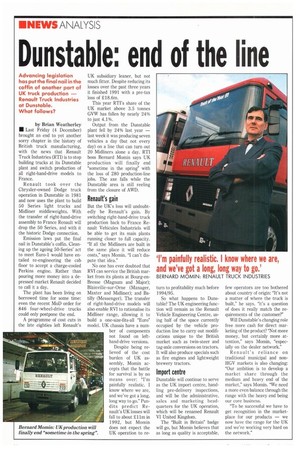Dunstable: end of the line
Page 16

If you've noticed an error in this article please click here to report it so we can fix it.
Advancing legislation has put the final nail in the coffin of another part of UK truck production — Renault Truck Industries at Dunstable.
What follows?
by Brian Weatherley • Last Friday (4 December) brought an end to yet another sorry chapter in the history of British truck manufacturing, with the news that Renault Truck Industries (RTI) is to stop building trucks at its Dunstable plant and switch production of all right-hand-drive models to France.
Renault took over the Chrysler-owned Dodge truck operation in Dunstable in 1981 and now uses the plant to build 50 Series light trucks and Midliner middleweights. With the transfer of right-hand-drive assembly to France Renault will drop the 50 Series, and with it the historic Dodge connection.
Emission laws put the final nail in Dunstable's coffin. Cleaning up the ageing 50-Series' act to meet Euro-1 would have entailed re-engineering the cab floor to accept a charge-cooled Perkins engine. Rather than pouring more money into a depressed market Renault decided to call it a day.
The plant has been living on borrowed time for some time: even the recent MoD order for 846 four-wheel-drive trucks could only postpone the end.
A programme of cost cuts in the late eighties left Renault's UK subsidiary leaner, but not much fitter. Despite reducing its losses over the past three years it finished 1991 with a pre-tax loss of £18.6m.
This year RTI's share of the UK market above 3.5 tonnes GVW has fallen by nearly 24% to just 4.1%.
Output from the Dunstable plant fell by 24% last year — last week it was producing seven vehicles a day (but not every day) on a line that can turn out 20 Midliners alone a day. RTI boss Bernard Momin says UK production will finally end "sometime in the spring" with the loss of 280 production-line jobs. The axe falls while the Dunstable area is still reeling from the closure of AWD.
Renault's gain
But the UK's loss will undoubtedly be Renault's gain. By switching right-hand-drive truck production back to France Renault Vehicules IndustrieIs will be able to get its main plants running closer to full capacity. "If all the Midliners are built in the same place it will reduce costs," says Momin. "I can't dispute that idea."
No one has ever doubted that RVI can service the British market from its plants at Bourg-enBresse (Magnum and Major); Blainville-sur-Orne (Manager, Maxter and Midliner); and Batilly (Messenger). The transfer of right-hand-drive models will also enable RVI to rationalise its Midliner range, allowing it to build a one-size-fits-all "Euro" model. UK chassis have a number of components not found on lefthand-drive versions.
Despite being relieved of the cost burden of UK assembly, Momin accepts that the battle for survival is by no means over: "I'm painfully realistic. I know where we are, and we've got a long, long way to go." Pundits predict Renault's UK losses will fall to about £11m in 1992, but Momin does not expect the UK operation to re turn to profitability much before 1994/95.
So what happens to Dunstable? The UK engineering function will remain as the Renault Vehicle Engineering Centre, using half of the space currently occupied by the vehicle production line to carry out modifications unique to the British market such as twin-steer and tag-axle conversions on tractors. It will also produce specials such as fire engines and lightweight brewery tractors.
Import centre
Dunstable will continue to serve as the UK import centre, handling pre-delivery inspections, and will be the administrative, sales and marketing headquarters for the UK operation, which will be renamed Renault VI United Kingdom.
The "Built in Britain" badge will go, but Momin believes that as long as quality is acceptable, few operators are too bothered about country of origin: "It's not a matter of where the truck is built," he says, "it's a question of does it really match the requirements of the customer?"
Will Dunstable's changing role free more cash for direct marketing of the product? Not more money, but certainly more attention," says Momin, "especially OD the dealer network."
Renault's reliance on traditional municipal and nonHGV markets is also changing: "Our ambition is to develop a market share through the medium and heavy end of the market," says Momin. "We need a more even balance through the range with the heavy end being our core business.
"To be successful we have to get recognition in the marketplace for our products — we now have the range for the UK and we're working very hard on the network."




































































































